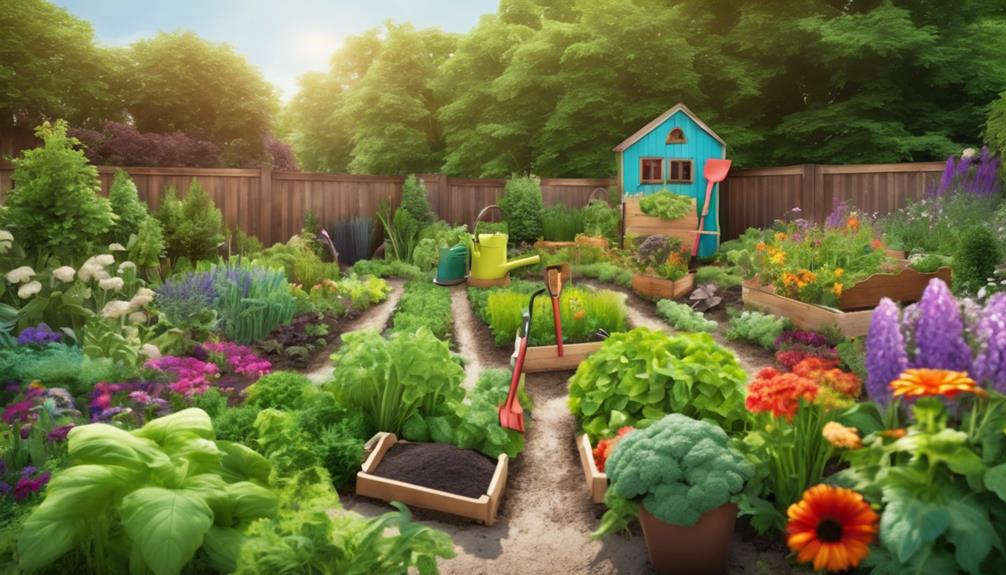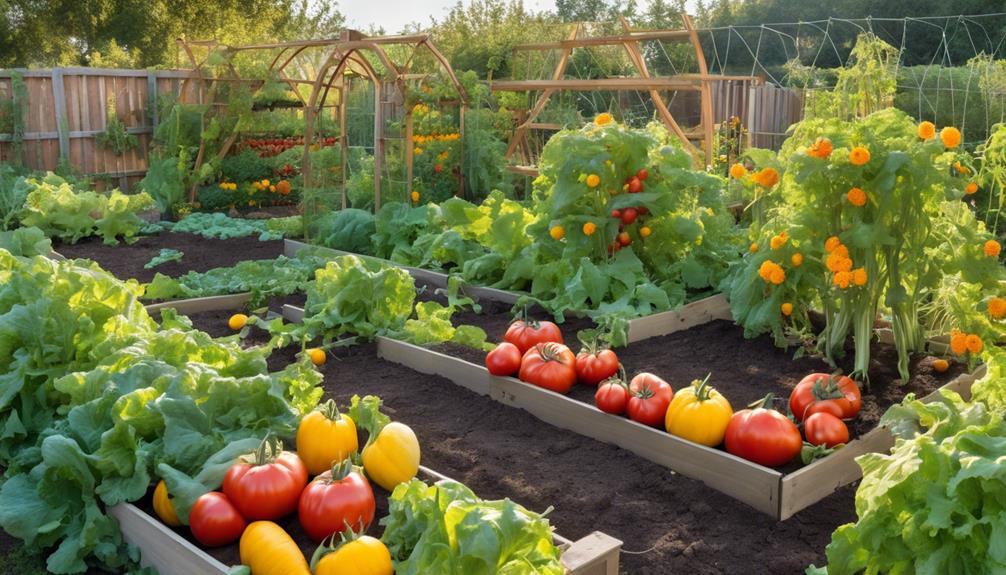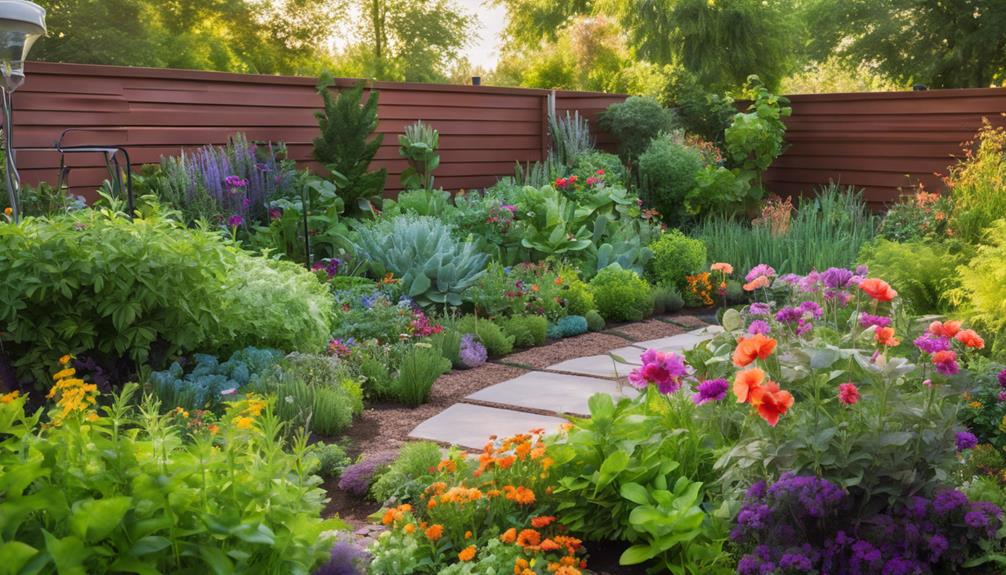
Top 5 Organic Tree Care Services for Gardens
23 January 2025
Garden Design Bearwood
23 January 2025Top organic garden maintenance services focus on enhancing sustainability and promoting biodiversity.
These services include soil health management, composting, and natural pest control techniques. Professionals assess soil conditions, implement crop rotation, and utilise organic fertilisers to support plant vitality.
They incorporate eco-friendly practices such as mulching to retain soil moisture and suppress weeds. Furthermore, services emphasise preventive measures, using beneficial insects and companion planting to foster a balanced ecosystem.
Choosing the right provider, like TKL Birmingham Gardener, guarantees tailored maintenance plans that meet your garden's unique needs.
Explore strategies to improve your garden's health and eco-friendliness for the best results.
Eco-Friendly Gardening Practices
Eco-friendly gardening practices are vital for promoting sustainability and enhancing the health of our ecosystems.
Effective sustainable soil management techniques, such as crop rotation and composting, improve soil fertility and structure.
Furthermore, utilising natural pest control methods minimises chemical usage while protecting beneficial organisms, fostering a balanced garden environment.
Sustainable Soil Management
Soil serves as the foundation for any thriving garden, making sustainable soil management critical for long-term ecological health. Effective management begins with enhancing soil structure through practices such as cover cropping, which enriches organic matter and reduces erosion.
Utilising compost not only provides essential nutrients but also fosters a diverse microbiome, which is imperative for nutrient cycling. Implementing crop rotation minimises nutrient depletion and disrupts pest cycles, promoting a balanced ecosystem.
Moreover, employing minimal tillage preserves soil integrity and prevents carbon loss. Regular soil testing allows for precise amendments tailored to specific needs, ensuring ideal pH and nutrient levels.
Natural Pest Control Techniques
Effective garden management extends beyond soil health to encompass pest control, which is crucial for maintaining a balanced ecosystem.
Employing natural pest control techniques not only protects your plants but also supports biodiversity. Integrated Pest Management (IPM) is a foundational strategy, incorporating biological controls such as beneficial insects—ladybirds and lacewings—that predate harmful pests.
Furthermore, the use of neem oil and insecticidal soaps can effectively disrupt pest life cycles without harming beneficial organisms. Companion planting further improves this approach; for instance, marigolds deter nematodes while attracting pollinators.
Regular monitoring and the introduction of natural deterrents like garlic or cayenne pepper sprays can also mitigate infestations. Together, these strategies create a resilient, productive garden that thrives in harmony with its environment.
Soil Health and Management
Soil health is fundamental to achieving a thriving organic garden, and effective management practices are crucial for sustaining its vitality.
Implementing composting techniques not only enriches the soil with nutrients but also improves its structure.
Furthermore, strategies such as crop rotation and integrated pest management can greatly enhance soil fertility while controlling pest populations.
Composting for Nutrient Enrichment
While many gardeners focus on plant care and watering schedules, composting plays a crucial role in improving soil health and nutrient availability.
By decomposing organic matter, compost enriches the soil, promoting a thriving garden ecosystem. Mastering composting techniques can yield significant benefits:
- Nutrient-Rich Amendments: Compost introduces important nutrients such as nitrogen, phosphorus, and potassium, which are essential for plant growth.
- Soil Structure Improvement: It enhances soil aeration and water retention, fostering a conducive environment for root development.
- Microbial Activity Enhancement: Compost encourages beneficial microorganisms, which assist in nutrient cycling and disease suppression.
Incorporating composting into your garden maintenance routine not only optimises soil health but also contributes to sustainable gardening practices, ensuring a robust and productive environment for your plants.
Crop Rotation Benefits
Implementing crop rotation in garden management offers numerous advantages for soil health and productivity. This practice enhances the soil's health and promotes a balanced ecosystem, leading to sustainable gardening.
Key benefits include:
- Nutrient Optimisation: Different crops have varying nutrient requirements, allowing for more efficient utilisation of soil nutrients and reducing the need for synthetic fertilisers.
- Soil Structure Improvement: Rotating crops can improve soil structure and aeration, enhancing water retention and root penetration, which are crucial for healthy plant growth.
- Diversity Improvement: Introducing a variety of plants encourages a diverse microbial community, which can lead to improved soil fertility and resilience against diseases.
Pest Management Strategies
Effective pest management strategies are essential for maintaining soil health and promoting a thriving garden ecosystem.
Employing integrated approaches not only minimises pest populations but also enhances the vitality of the soil.
Here are three key strategies:
- Biological Control: Introduce beneficial insects, such as ladybirds and parasitic wasps, which naturally suppress pest populations without harming the ecosystem.
- Cultural Practices: Implement crop rotation and companion planting to disrupt pest life cycles and bolster plant resilience against infestations.
- Organic Pesticides: Utilise natural substances, such as neem oil or diatomaceous earth, to target specific pests while preserving beneficial organisms and soil health.
Garden Tool Selection Tips
Selecting the right tools is fundamental to effective organic gardening, beginning with an initial soil assessment to determine the specific needs of your garden.
Furthermore, appropriate tools can facilitate mulching for moisture retention and support companion planting strategies that improve plant health and productivity.
Initial Soil Assessment
A thorough initial soil assessment is crucial for successful organic garden maintenance, as it lays the foundation for healthy plant growth. This evaluation helps identify the soil's nutritional status, pH levels, and general structure.
To conduct an effective soil assessment, consider the following steps:
- Collect Soil Samples: Gather samples from different locations within your garden to ensure a comprehensive analysis.
- Test for Nutrients: Utilise a soil testing kit or send samples to a laboratory to ascertain nutrient levels and deficiencies.
- Analyse Soil Structure: Assess the soil texture—sandy, loamy, or clayey—to understand its water retention and aeration capabilities.
Mulching for Moisture Retention
Mulching is an essential technique in organic garden maintenance that significantly enhances moisture retention in the soil. By creating a protective layer over the soil, mulching effectively reduces evaporation, regulates temperature, and suppresses weed growth.
To optimise the benefits of mulching, consider the following garden tool selection tips:
- Mulch Types: Choose organic materials such as straw, wood chips, or shredded leaves, which decompose over time, enriching the soil.
- Application Depth: Aim for a depth of 5-10 centimetres to ensure ideal moisture retention without suffocating plant roots.
- Distribution Technique: Use a rake or your hands to distribute mulch evenly, ensuring coverage around the base of plants while avoiding direct contact with stems.
Employing these strategies will improve your garden's health and productivity.
Companion Planting Strategies
While understanding the principles of companion planting is crucial for enhancing biodiversity and promoting healthy growth in an organic garden, the right tools can greatly assist in implementing these strategies effectively.
Selecting the appropriate garden tools ensures precision and efficiency in your planting endeavours. Consider the following essential tools:
- Hand Trowel: Ideal for planting small companion plants and ensuring proper spacing.
- Garden Fork: Useful for aerating soil and mixing compost with existing soil to optimise nutrient availability for companion pairs.
- Soil Tester: Vital for analysing pH levels, enabling you to select compatible plants that thrive under specific soil conditions.
Increased Biodiversity in Gardens
Biodiversity in gardens plays a crucial role in creating resilient ecosystems and fostering a healthy environment. By incorporating a range of plant species, gardeners can improve soil health, enhance pollination, and attract beneficial organisms. Varied plant communities create microhabitats that support diverse wildlife, leading to a balanced ecosystem.
| Key Benefits | Examples of Biodiversity Practices | Impact on Ecosystem |
|---|---|---|
| Soil Health | Intercropping | Improved nutrient cycling |
| Pollinator Support | Native plant integration | Boosted pollinator activity |
| Pest Resistance | Plant diversity | Natural pest regulation |
Embracing biodiversity not only enriches the garden's aesthetic value but also contributes significantly to ecological sustainability, making it crucial for modern gardeners to adopt such practices.
Sustainable Pest Control Techniques
Sustainable pest control techniques are crucial for maintaining the health and productivity of organic gardens. This includes the use of natural insect repellents, the introduction of beneficial nematodes to improve soil health, and the application of organic fertilisers to promote plant vigour.
Natural Insect Repellent Methods
How can gardeners effectively protect their plants from pests without resorting to harmful chemicals?
Employing natural insect repellent methods offers a sustainable approach to pest management. Here are three effective techniques:
- Neem Oil: Extracted from the seeds of the neem tree, neem oil disrupts the life cycle of pests, preventing them from feeding and reproducing.
- Diatomaceous Earth: This natural powder, made from fossilised algae, acts as a desiccant, damaging the exoskeletons of insects upon contact and leading to dehydration.
- Essential Oils: Oils such as peppermint, lavender, and tea tree can be diluted and sprayed on plants to deter a variety of insects with their potent scents.
Implementing these methods can improve plant health while promoting an eco-friendly gardening practice.
Beneficial Nematodes for Soil Health
Beneficial nematodes are microscopic roundworms that play an essential role in maintaining soil health while providing effective pest control.
These organisms target pest insects in their larval stages, thereby reducing populations without harming beneficial species. Their application fosters a balanced ecosystem, promoting sustainable gardening practices.
Benefits of utilising beneficial nematodes include:
- Targeted Action: They specifically seek out and parasitise harmful larvae, minimising collateral damage to non-target organisms.
- Soil Health Improvement: By controlling pest populations, they enhance soil aeration and nutrient availability, fostering robust plant growth.
- Chemical-Free Solution: Nematodes offer a natural alternative to synthetic pesticides, aligning with eco-friendly gardening principles.
Incorporating beneficial nematodes into your maintenance strategy is a proactive step towards sustainable soil management.
Organic Fertilizer Application Methods
The application of organic fertilisers is a crucial component in promoting plant health while simultaneously supporting sustainable pest control techniques.
Utilising organic fertilisers not only nourishes plants but also improves soil ecology, which can deter pests naturally.
Here are three effective methods for applying organic fertilisers:
- Soil Incorporation: Mix compost or well-rotted manure into the soil before planting, ensuring nutrients are evenly distributed for optimal root uptake.
- Top-Dressing: Apply a layer of organic mulch or compost around established plants to gradually release nutrients while suppressing weeds and retaining moisture.
- Liquid Fertilisers: Use diluted organic liquid fertilisers as foliar sprays to provide immediate nutrient access, stimulating plant vigour and resilience against pests.
Mastering these methods will lead to a thriving, eco-friendly garden ecosystem.
Pest Resistance and Management
Effective pest resistance and management strategies are integral to maintaining a thriving organic garden.
Implementing soil erosion prevention techniques, along with mulching and organic weed suppression methods, not only improves soil health but also creates an environment less conducive to pest infestations.
These practices work synergistically to protect plant integrity while promoting biodiversity within the ecosystem.
Soil Erosion Prevention Techniques
A variety of soil erosion prevention techniques are vital for maintaining healthy organic gardens, particularly when addressing the dual challenges of pest resistance and management.
Effective erosion control not only preserves soil integrity but also fosters a resilient ecosystem that can deter pests naturally.
Consider implementing the following strategies:
- Cover Cropping: Utilise cover crops such as clover or vetch to stabilise soil and improve organic matter, thereby enhancing fertility and moisture retention.
- Contour Farming: Implement contour planting along the natural contours of the land to reduce runoff and improve water absorption, which supports plant health.
- Terracing: Create terraces on slopes to slow down water flow and prevent soil loss, whilst also providing distinct planting areas for diverse crops.
These techniques are important for creating a sustainable organic garden.
Mulching to Suppress Weeds
Weed suppression is a crucial aspect of organic garden management, contributing significantly to pest resistance and overall plant health. One of the most effective strategies for achieving this is through mulching.
Mulching not only inhibits weed growth but also improves soil moisture retention and regulates temperature, creating a more favourable environment for desirable plants.
Consider the following benefits of mulching:
- Weed Barrier: A thick layer of mulch blocks sunlight, preventing weed seeds from germinating.
- Moisture Conservation: Organic mulches retain soil moisture, reducing the need for frequent watering.
- Soil Enrichment: As organic mulches decompose, they enrich the soil with nutrients, fostering healthy plant growth.
Implementing mulching effectively will elevate your organic gardening practices and support sustainable pest management.
Organic Weed Suppression Methods
Maintaining a healthy organic garden requires a multifaceted approach to weed suppression, particularly when considering pest resistance and management. Effective organic methods not only address weeds but also foster a resilient ecosystem.
Here are three crucial strategies:
- Cover Cropping: Planting cover crops suppresses weeds by outcompeting them for nutrients and light while enriching the soil with organic matter.
- Hand Weeding: Regularly removing weeds by hand prevents seed production and minimises the need for chemical interventions, promoting soil health and pest resistance.
- Natural Herbicides: Utilising organic herbicides such as vinegar or boiling water can effectively target specific weeds without harming beneficial organisms.
Implementing these strategies guarantees a thriving, eco-friendly garden while maintaining a balance against pests.
Why Choose TKL Birmingham Gardener
Choosing TKL Birmingham Gardener guarantees exceptional care for your organic garden, underpinned by a commitment to sustainable practices and customer satisfaction.
Our team of seasoned professionals employs advanced techniques tailored to enhance soil health and promote biodiversity, ensuring your garden thrives. We prioritise eco-friendly methods that minimise chemical use, thereby protecting the environment and your family's well-being.
In addition, TKL Birmingham Gardener offers personalised maintenance plans that cater to the unique needs of your garden, fostering a flourishing ecosystem.
Our dedication to ongoing education in organic gardening ensures that we remain at the forefront of best practices and innovations.
With TKL, you can trust that your garden is in expert hands, allowing you to revel in its beauty without the burden of upkeep.
Common Gardening Questions Answered
Gardeners often have a myriad of questions as they endeavour to cultivate healthy, thriving plants. Common inquiries frequently include the best soil composition for specific plants, the importance of crop rotation, and effective pest management strategies.
Understanding the nutrient requirements of different plants is essential, as it informs both fertilisation practices and soil amendments. Moreover, gardeners often seek guidance on appropriate watering techniques, as over- or under-watering can severely impact plant health.
Seasonal timing for planting and harvesting also raises questions, as these factors greatly influence yield and vitality. By addressing these common concerns with research-backed methods and sustainable practices, gardeners can improve their skills, foster biodiversity, and achieve a flourishing organic garden.
Implement Seasonal Planting Schedules
To enhance the success of an organic garden, implementing seasonal planting schedules is crucial. A well-structured planting schedule ensures that crops are sown at the optimal time, boosting yield and reducing pest issues.
Consider these three key components:
- Climate Awareness: Understand your local climate zones and seasonal changes to select appropriate planting windows.
- Crop Rotation: Implement a rotation strategy to maintain soil health and prevent disease build-up, strategically timing plantings of legumes, brassicas, and root vegetables.
- Succession Planting: Increase productivity by planning successive sowings of quick-maturing crops, ensuring a continuous harvest throughout the growing season.




